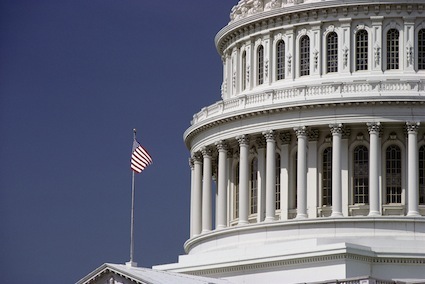Senate Judiciary Panel Approves EARN It Act
Bill would boost edge providers’ responsibility to take down illegal content

The smarter way to stay on top of the multichannel video marketplace. Sign up below.
You are now subscribed
Your newsletter sign-up was successful
The Senate Judiciary Committee has favorably reported the EARN It Act to the full Senate, but with the agreement to work on some issues as it moves toward a floor vote.
The Eliminating Abusive and Rampant Neglect of Interactive Technologies [EARN IT] Act would remove Section 230 immunity from liability from edge providers who knowingly distribute or promote child sexual abuse materials on their websites.
The vote came during a committee markup of the bill on Thursday (Feb. 10).
Computer companies have opposed the EARN It Act, while law enforcement and child protection advocates support it. Some human rights groups have expressed issues about encryption and privacy and the bill‘s impact on journalists and others.
The EARN It Act would not mandate an affirmative duty for companies such as Google, Amazon, Netflix or Facebook to police their sites or review material. It would only remove the immunity for not “reasonably inspecting” their material, which means if they are informed of such material and do nothing to keep it off their sites, they would lose civil liability immunity for that particular third-party content.
One issue was the bill's impact on encryption of private communications, but bill co-sponsor Sen. Richard Blumenthal (D-Conn.) said that the bill does not prohibit encryption, but only the misuse of encryption to further illegal activity.
Also: DAs Make Case for EARN It Act
Both Democrats and Republicans signaled that if any Big Tech company tried to use the lack of an affirmative duty as a loophole, those legislators might have to circle back and mandate that the sites review their material.
Sen. Lindsey Graham (R-S.C.), the bill's other principal co-sponsor, said that whether there should be an affirmative duty to police sites is another issue and that when informed of such content he hoped Big Tech would act responsibly. If not, he signaled such a duty would be “in his next bill.”
Blumenthal said that despite the arguments of Big Tech‘s armies of lawyers, the bill was not about encryption, which he called a “gigantic red herring,” or free speech, he said. “Rape is not free speech,” he said. There are companies that are vigorous partners in the effort to fight child sexual abuse, he added, because they know it can be done.
He said the bill was about expanding mandatory reporting, doubling the time that companies are required to preserve evidence of child exploitation, fostering the next generation of technology to fight abuse and holding tech companies accountable when they fail to supervise and prevent the spread of child sexual abuse material.
Among the issues to be worked out before a full Senate vote include whether not having the affirmative obligation in the bill is a loophole that needs fixing now, clarifying the encryption provision, the impact of the law on smaller websites and whether a state definition of knowledge of illegal material should be incorporated into the bill, as is currently the case.
Sen. Mike Lee (R-Utah) pointed out that could mean that in Illinois, for example, whose knowledge standard goes beyond “knew” to “should have known,” tech platforms could be held to that standard.
Blumenthal said he thought incorporating state standards was still better than “straitjacketing” them to a federal standard. ■
The smarter way to stay on top of the multichannel video marketplace. Sign up below.
Contributing editor John Eggerton has been an editor and/or writer on media regulation, legislation and policy for over four decades, including covering the FCC, FTC, Congress, the major media trade associations, and the federal courts. In addition to Multichannel News and Broadcasting + Cable, his work has appeared in Radio World, TV Technology, TV Fax, This Week in Consumer Electronics, Variety and the Encyclopedia Britannica.

